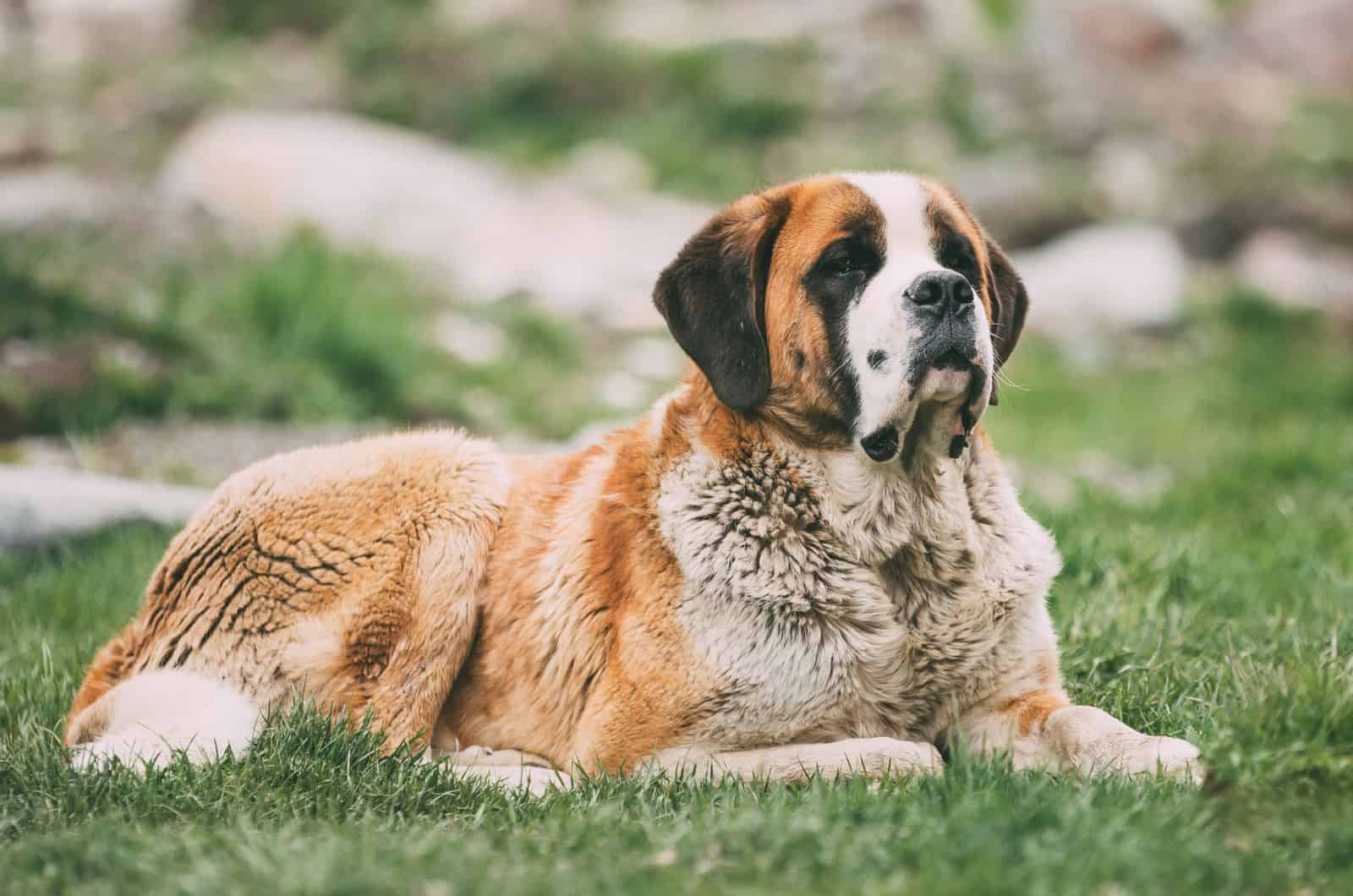One parent is from Switzerland, while the other parent is from England. They’re completely contrasting breeds, but they still managed to join forces and create one pawdorable puppy.
Meet the Mini St. Bernard!
Our Mini buddy has working dog and retriever blood in his veins. He’s hardworking, friendly, loyal, and still fashions a stunning appearance.
Of course, the official kennel club in America won’t recognize them as they’re hybrid dogs, but we, true dog lovers, will!
Truth be told, Mini St. Bernards iare one of the most incredible mixed breed dogs. I bet you’re thinking of getting one yourself, aren’t you?
If you’re having any doubts, I’m here to scare them away.
Here, we’ll give you have 14 reasons why and why not the Mini St. Bernard might be the ideal pet for you.
By the end of this article, you’ll be able to figure out if this is really the dog breed for you.
1. They’re A Compact Size Cross Puppy
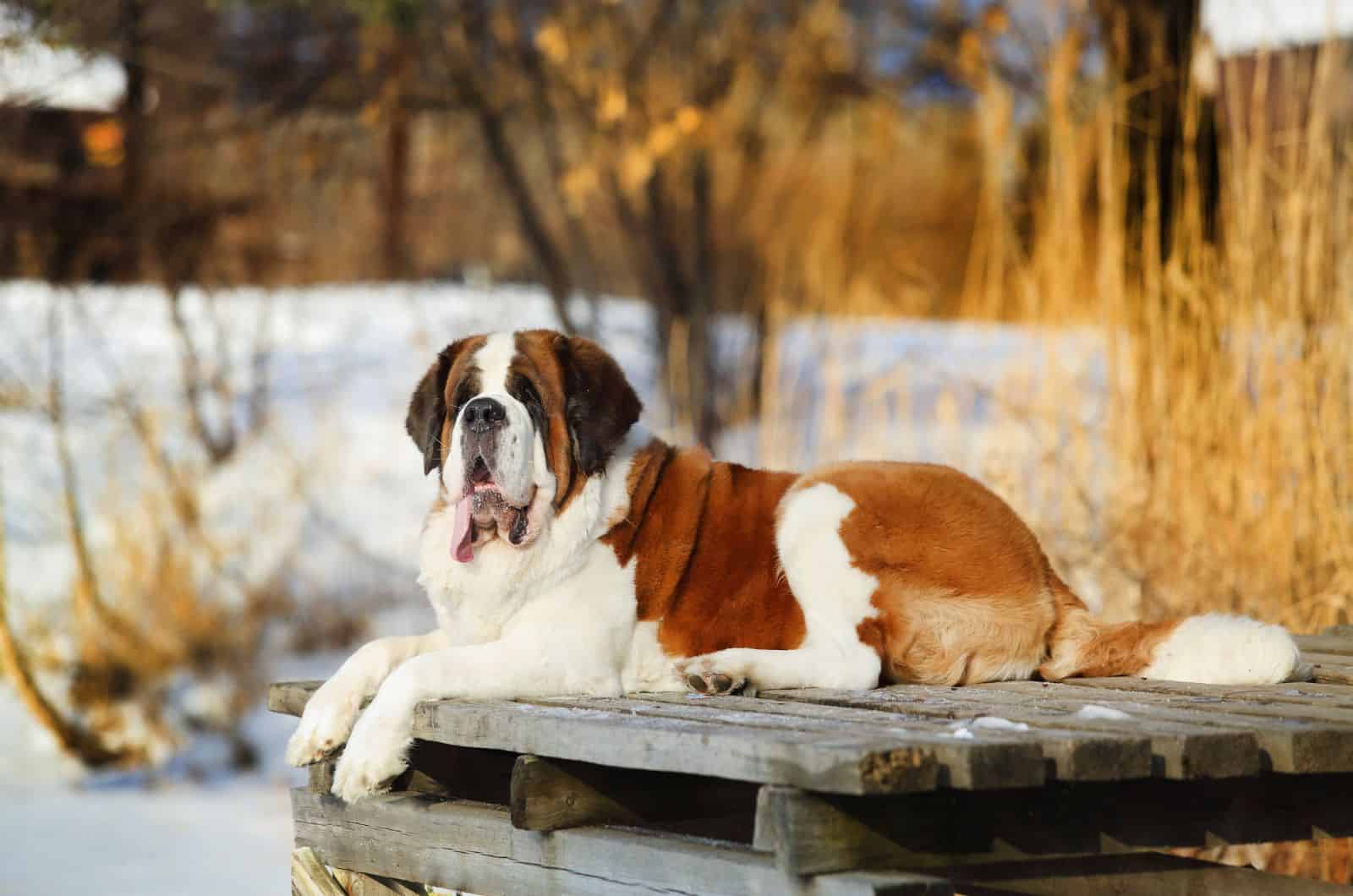
When someone mentions a miniature version of a certain dog breed, we immediately think of a pocket-sized pooch as a result of breeding litter runts or genetic manipulation.
But, luckily, that’s not the case with our Mini St. Bernard.
PupVine’s always pro crossbreeding if it will get us a new and improved hybrid dog. Of course, when it’s it’s done according to the right procedures.
That’s why I’m delighted to inform you that the Mini St. Bernard is actually a mixed breed dog from the gentle giant, the Saint Bernard, and the lovely Cocker Spaniel.
What a surprise!
The Saint Bernard dog breed is a big and robust one, while the other parent, the Cocker Spaniel, is smaller, sweet, and gentle.
The size of a Mini St. Bernard isn’t as mini as you might expect it to be. But, this isn’t one of those teacup dogs anyway. Since it comes from a large breed parent, the only way these puppies turn out is small to medium-sized. The Cocker genes make the puppies lean more towards a small size.
On average, your Mini St. Bernard should grow up to be around 15 to 19 inches at the withers. His weight ranges more than his height. That’s why you can expect this pooch to weigh anywhere from 15 to 60 pounds.
Two Size Variations
Oddly enough, there can be two size variations of this St. Bernard Cocker Spaniel mix. Mini St. Bernards can come in Micro and Nehi St. Bernard.
I bet this is the first time you hear the term “Nehi”!
Nehi St. Bernards are on the bigger end of the scale when it comes to the size of Mini St. Bernards. Micros are, naturally, a lot smaller.
Sometimes, breeders will cross some other dog breeds to get Mini St. Bernards in Micro or Nehi. But, you should make sure that your puppy has at least 50% of a Saint Bernard’s blood.
2. They Have A Lovely Appearance
Before we look in-depth at how Mini St. Bernards look, we have to agree on one thing: Mini St. Bernards can only be stunningly-beautiful dogs because they come from equally stunning parents.
Mini St. Bernards will really resemble purebred Saint Bernards. It appears as if they’ve got nothing inherited from the Cocker Spaniel side of the family. I’ve rarely seen a Mini St. Bernard that looks a lot like a Cocker. Still, they’re possible. Rare, but it can happen.
These hybrid pups will have a thick coat that usually comes in red, white, fawn, cream, brindle, brown, sable, blue, black, and silver. As you can see, the diversity of the parent breeds make sure that the puppies can inherit lots of interesting coat colors.
All St. Bernard colors are possible, as well as Cocker coat color options.
Different coat textures are also present, such as silky, straight, wavy, and coarse. It all depends on which parent the puppy takes after.
Mini St. Bernards are sturdy dogs. They’re bulky, with big paws, broad heads, and wide muzzles. Their ears are floppy, and the tail can be feathered and covered in a rich coat.
All in all, Mini St. Bernards are a pleasant sight. They look like little purebred St. Bernard puppies, which makes them even more adorable!
3. They Have A Unique Origin Story
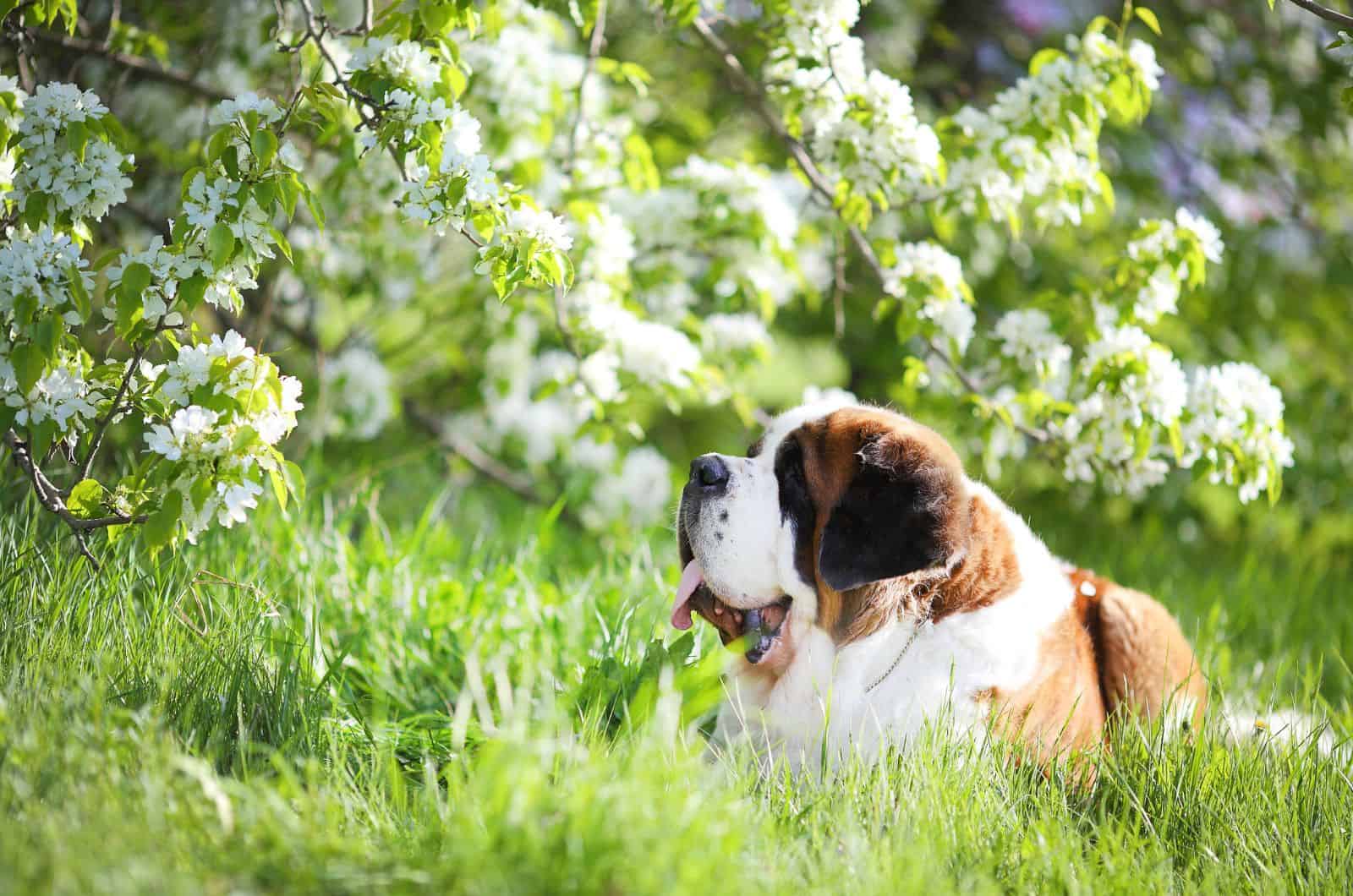
Every dog breed has its own story. Of course, we won’t adopt a pup just because his history is interesting. A cool story is just a cool conversation starter and nothing else.
However, it can tell you a lot about the dog’s temperament and skills. For example, the Saint Bernard parent was always a hardworking dog from the Alps, precisely from the Saint Bernard Pass. It has impacted his temperament significantly and shaped them into what they are today.
But, what about the unique cross called the Mini St. Bernard?
Like most designer dogs, the Mini St. Bernard was bred sometime in the 1990s. This was the golden age for creating new hybrids and manipulating dog breeds in order to get a special pooch. A lot of popular crossbreed dogs come from this era, such as the Goldendoodle.
Primarily, crossbreed dogs, or designer dogs from the turn of the century, were bred to achieve low-shedding or hypoallergenic traits. But, our Mini St. Bernard isn’t hypoallergenic. A Cocker Spaniel’s not hypoallergenic, and neither is our Saint Bernard.
The biggest reason why people decided to breed Minis was to achieve a compact size while maintaining the Saint Bernard’s mastiff-like appearance and temperament.
Well, they sure had a lot of success.
The next time someone in the park asks you what kind of dog breed you’re walking, you can proudly say a unique cross between a Saint Bernard and a Cocker Spaniel, the Mini St. Bernard!
4. They Have A Super Sweet Temperament
When you breed a gentle giant like our Saint Bernard with a family-friendly dog like the Cocker Spaniel, you can only get one incredible pooch.
The Mini St. Bernard is a little social butterfly. He enjoys spending time with his family, making sure everyone’s looking happy. Those are the kind of dogs that we all need in our lives!
This lovely hybrid is loyal to the bone and thrives when surrounded by its family members. As you can imagine, they’re true family dogs, suitable even for families with little children.
Of course, I’d recommend that you have your dog socialized and trained before you bring him into a household with kids. Our Mini still has a Cocker Spaniel’s blood, and we all know that they’re impeccable hunters with strong prey drives.
Mini St. Bernards aren’t aggressive by default. The St. Bernard parent isn’t dangerous at all, and the Cocker mommy or daddy isn’t aggressive either. Train them the right way and you’ll have a companion that will always stick by your side.
As far as their relationship with unknown people goes, you could say that they’re not that open to newcomers. A Mini St. Bernard can’t be a good guard dog, but he can be an excellent watchdog. He’s alert, ready to react, and puts his family first.
5. They Have A Hardworking Nature
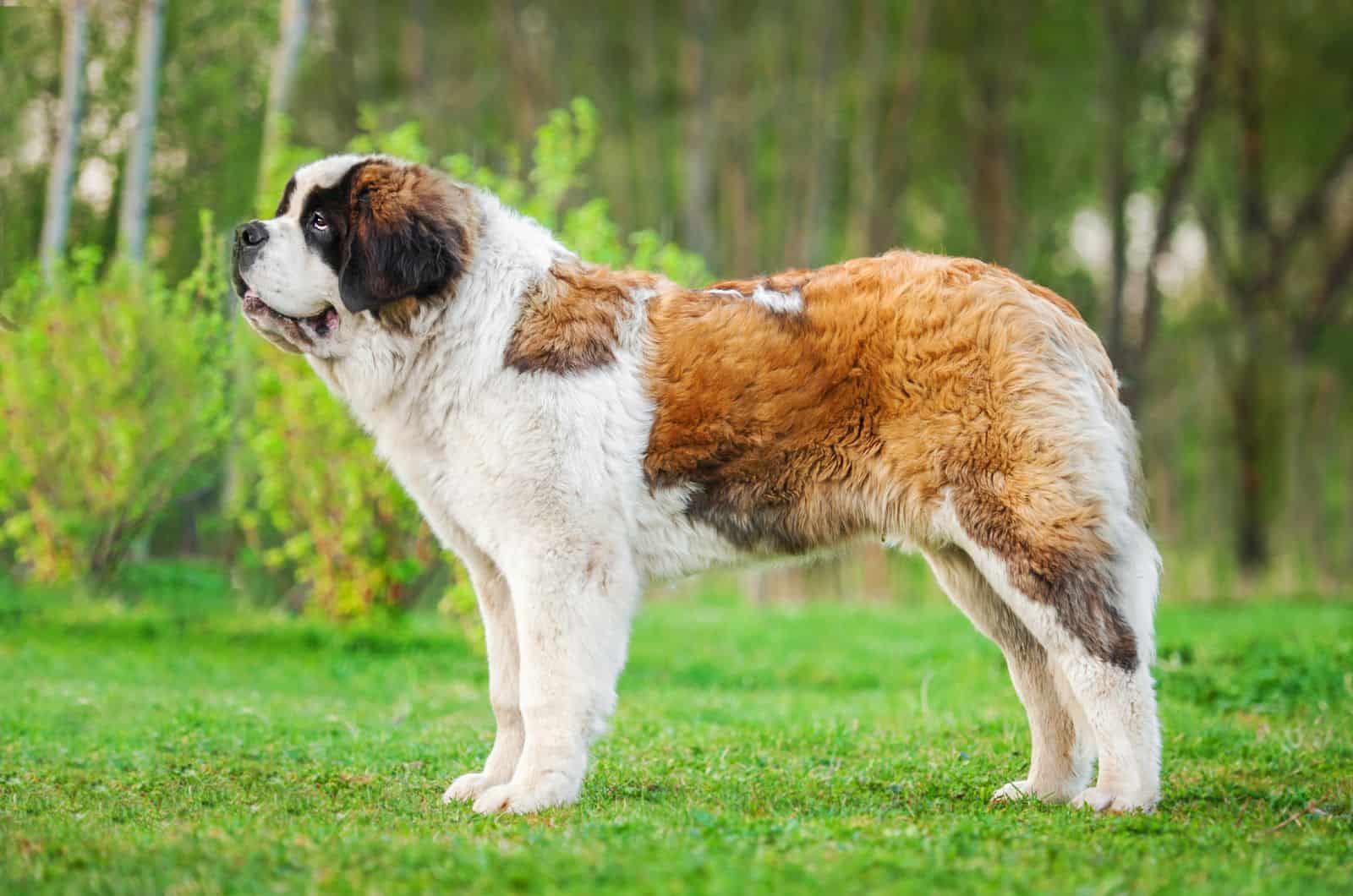
You might think that the typical Saint Bernard is an active dog. Well, he’s not. He’s just big, so you assume by default that he’s highly active.
Saint Bernards are big dogs with lots of pounds hiding under that thick coat. It’s a bit difficult for them to run all day long.
That’s why Mini Saint Bernards are more active than the popular gentle giants. This is to do with the fact that they come from a Spaniel parent.
Cocker Spaniels were always hard-working dogs. They were bred to be excellent hunters and assistants during hunting trips. And they never failed their owners. Cocker Spaniels are one of those gun dogs with a strong work ethic. Give them a task and watch them complete it like it’s nothing.
Their strong working genes have transferred over to Mini St. Bernard puppies. Combine this with a purebred Bernard’s cart pulling hobby, and you’ll get a dog that could easily serve as a rescue dog in the Swiss Alps. Yes, their abilities to do a job with utmost quality are stunning.
Provide your Mini St. Bernard with daily exercise for at least an hour or so. If you don’t have time to do some fun tasks, you can run together and play ball. Do anything that you or your dog likes and drain those energy levels.
You don’t still want an energetic Mini St. Bernard by the end of the day.
6. They Are Smart Cookies
Mini St. Bernards can brag about being really smart cookies because they come from two quite intelligent parents.
Even though the Saint Bernard isn’t ranked high on the list of the most important dogs, he’s still an intelligent dog. He’s sensitive, attentive, and can understand humans like no other dog breed. Sure, training can be a bit problematic since they’re stubborn dogs, but still…
On the other hand, the Cocker Spaniel parent is extremely smart, based on the list of the smartest dogs in the canine kingdom.
A combination of two genius pooches can only result in another genius. Some might say that the Mini St. Bernard is a hybrid vigor, but that’s yet to be discussed.
When it comes to training a Mini St. Bernard, I recommend that you focus on providing a lot of positive reinforcement. They respond very well to praises and rewards, so figure out what works the best for your Mini.
Also, try not to lose your cool after the first lesson. Chances are, your Mini won’t listen at all and all he’ll want to do is play. They’re slow learners, but once they catch on to something, it’s for good.
It’s crucial to let your Mini know who’s in charge. Become the alpha of your pack, or this pawdorable mini buddy will take charge of everything.
7. They Have An Affordable Price
A lot of designer dogs and hybrids come at a pretty high price. But, usually, they’re fancy pooches, i.e. teacup Yorkies or teacup Maltese.
Our Mini St. Bernard buddy isn’t as fancy as some might think. Of course, that doesn’t make him any less special. These super cute small dogs are absolutely special, and they come at a pretty affordable price.
You really can’t wish for more great things from the Mini. You can’t, but you’ll get even more!
Mini St. Bernard puppies belong in the mid-range of dog prices. You can find a good Mini St. Bernard puppy for about $800 to $1,000. Add some nifty dog items from Amazon, and your bill will jump up by several hundred dollars.
Cocker Spaniel parents are a bit more expensive, and you can find all the details on their price here.
7 Reasons Why A Mini St. Bernard Might Not Be For You
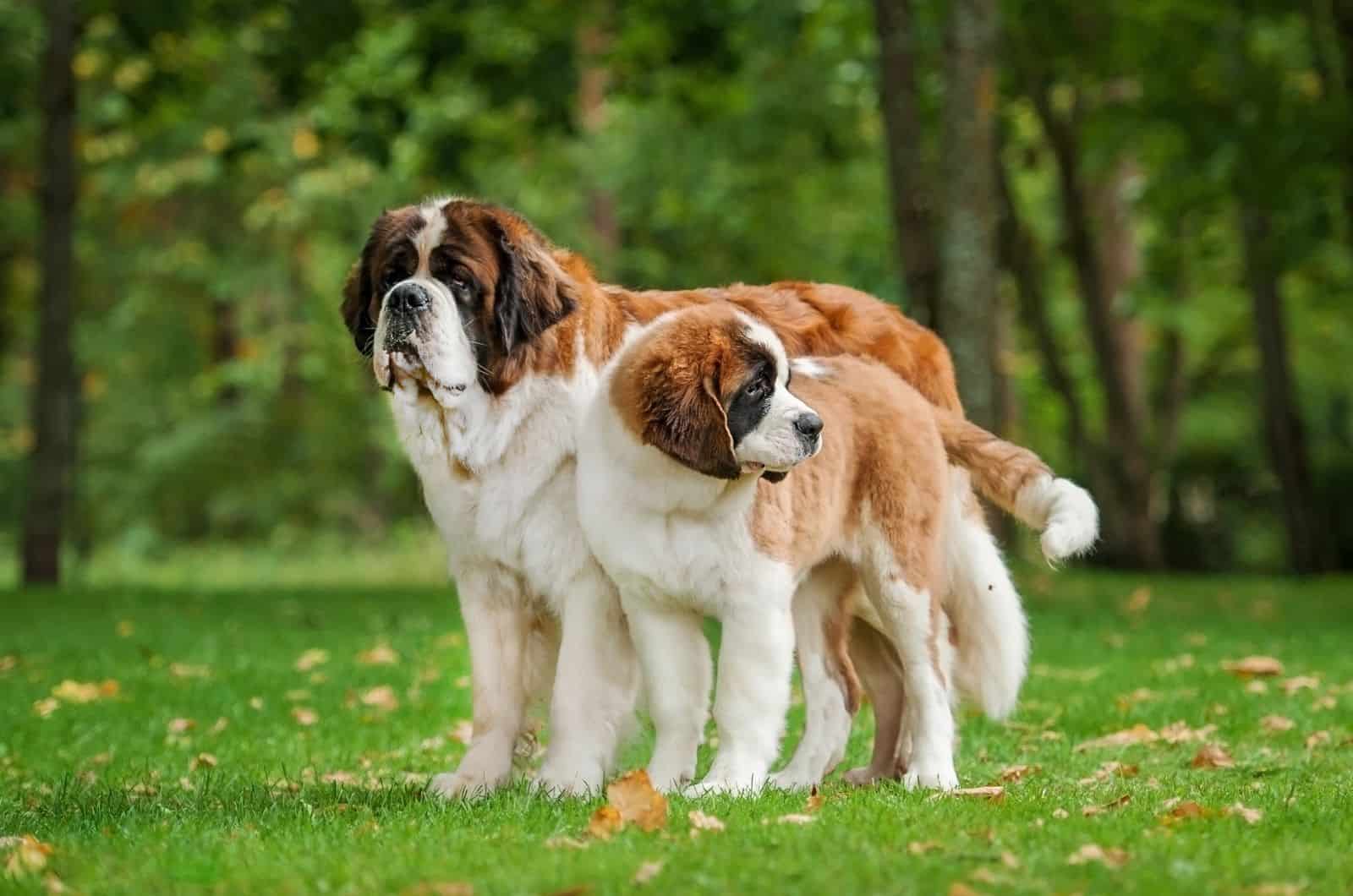
Of course, no matter how pawmazing the Mini St. Bernard is, you have to be ready to face some of his downsides. Every dog breed will have them. But, these downsides are completely individual. Some of you might hate the drooling part, while others won’t mind it.
How about we take a look at the most common downsides of this crossbreed puppy, so you can decide later which ones are turn-offs for you?
1. They’re Huge Shedders
Okay, the shedding part can’t be someone’s favorite, right? I mean, who would love to spend the entire day brushing that little shedding monster?
Sadly, none of the parents are hypoallergenic, so there’s no chance of a Mini St. Bernard being hypoallergenic either. This isn’t one of those low-maintenance dogs either. You’ll need lots of time and a commitment to daily brushing if you want a good-looking Mini.
The Saint Bernard parent has passed down a thick, double coat. That means you’ll need the fullrange of grooming tools, including de-shedding brushes, trimmers, pin brushes, and combs to help your pooch through the shedding season. In case you’re wondering, these pups usually shed in the spring and the fall.
Also, the Cocker parent sheds too, so you know that your pup will be destined for a hairy life.
Another important part of the grooming routine should be bathing. Since you’ve got a dog with a thick coat, this means you shouldn’t bathe it too often. Otherwise, you’ll risk the coat losing its natural shine. The skin underneath will become dry and patchy.
Shedding can be such an issue for people who are prone to dog-related allergies. On top of it all, there’s another problem with Mini St. Bernards and allergic people. It’s drooling, which we’ll discuss in the following paragraph.
2. They Drool A Lot
People can be allergic to dogs, but it’s not only their furry coat to blame. Dander, sweat, and saliva can also be triggers of severe allergic reactions. If you’re allergic to dogs, and you have a drooler at home, you won’t have much fun together.
Some experts even claim dander and saliva cause more reactions than just hair itself. You see, when a dog sheds, he loses hair all over the home. Those stranded hairs will end up on your sofa, on your kitchen table, and even on your bed. Dander and saliva will cling onto the hair and thus, cause a reaction.
Sadly, Mini St. Bernards are droolers. They have inherited it from the Swiss side of their family.
But, what do you do with a drooling dog at home?
You can’t really do a lot. All you can do is tolerate the drooling. A lot of dogs only drool when they see dog food coming or they see you eating something yummy. So, stop dining in front of your dog, and don’t make such a fuss out of his meals.
Don’t call him to eat too soon, especially when the food’s not ready. Anticipating food will make your dog drool even more. Keep a tight schedule. Maybe the Cocker Spaniel’s feeding chart might help you to find the right feeding schedule for your Mini St. Bernard!
But, just in case, always keep an old towel or a rug handy to wipe off those drools.
3. They Can Be Stubborn
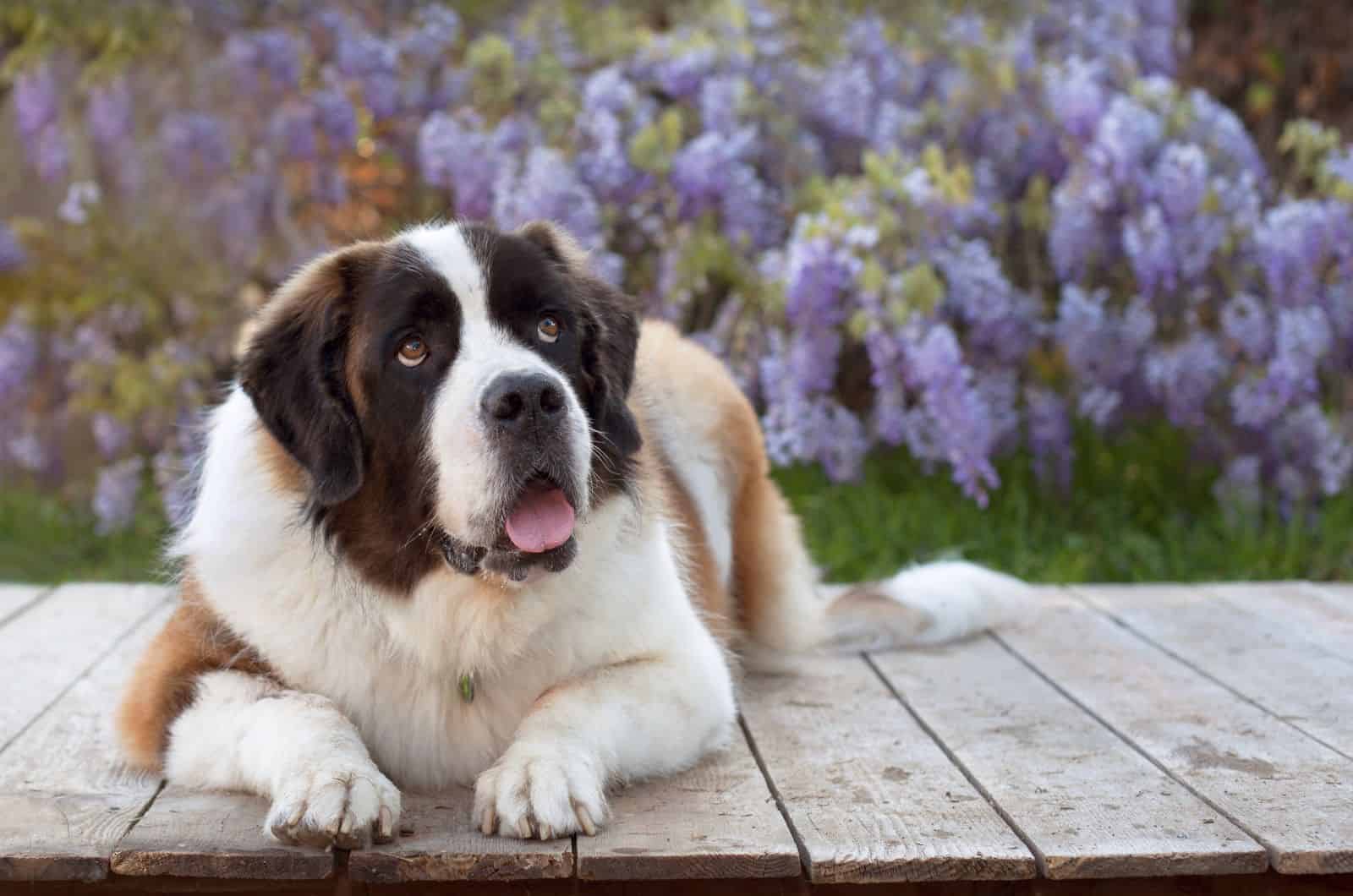
Mini St. Bernards are truly wonderful, but boy they can be stubborn! These pups are as stubborn as Doxies or Chihuahuas, and that’s very!
You might think: being stubborn is not a downside. It won’t be hard to handle the Mini St. Bernard.
But, it definitely will be hard on you.
Mini St. Bernards will show off their stubborn side, especially when going through obedience training. I already mentioned to you that they won’t listen and might test you.
Sometimes, a Mini can inherit a Cocker’s proneness to barking. So, that’s another thing to get under control.
You must be extra focused on their lessons if you want an obedient dog.
Note though,, their stubbornness will disappear once you start praising them for a job well done.
4. They Are Prone To Separation Anxiety
Never leave your Mini St. Bernard dog alone for too long.
If you’ve learned anything from today’s lesson, you know that Minis are extremely loyal and love being surrounded by family.
If you go outside and don’t bring your Mini, the chances are that he’ll feel sad. Repeating this pattern every day might result in your dog feeling rejected. Furthermore, this will definitely lead to separation anxiety, a tough mental condition that strikes a lot of dogs, including this little doggo!
If you suspect your dog has mental retardation, please do some reading here.
5. They’re Prone To Some Severe Health Problems
It’s always tricky with crossbreed dogs. They come from two different parents, and as such, they’re more prone to developing certain health issues.
Sadly, I can’t tell you that St. Bernards are generally healthy dogs. They have lots of signature health conditions.
As for the Cocker parent, they’re okay but can still suffer with some problems that need veterinary assistance.
The following health issues I’ll list may or may not strike your dog.
Just to be prepared, here are the most common health problems with Mini St. Bernards:
hip dysplasia
bloat or Gastric Dilatation Volvulus
elbow dysplasia
epilepsy
progressive retinal atrophy (PRA)
cataracts
patellar luxation
osteosarcoma
entropion
ectropion, etc.
However, if you take good care of your Mini St. Bernard, the chances that your dog will develop any of the mentioned conditions are minimal.
6. They Can Have A Short Lifespan
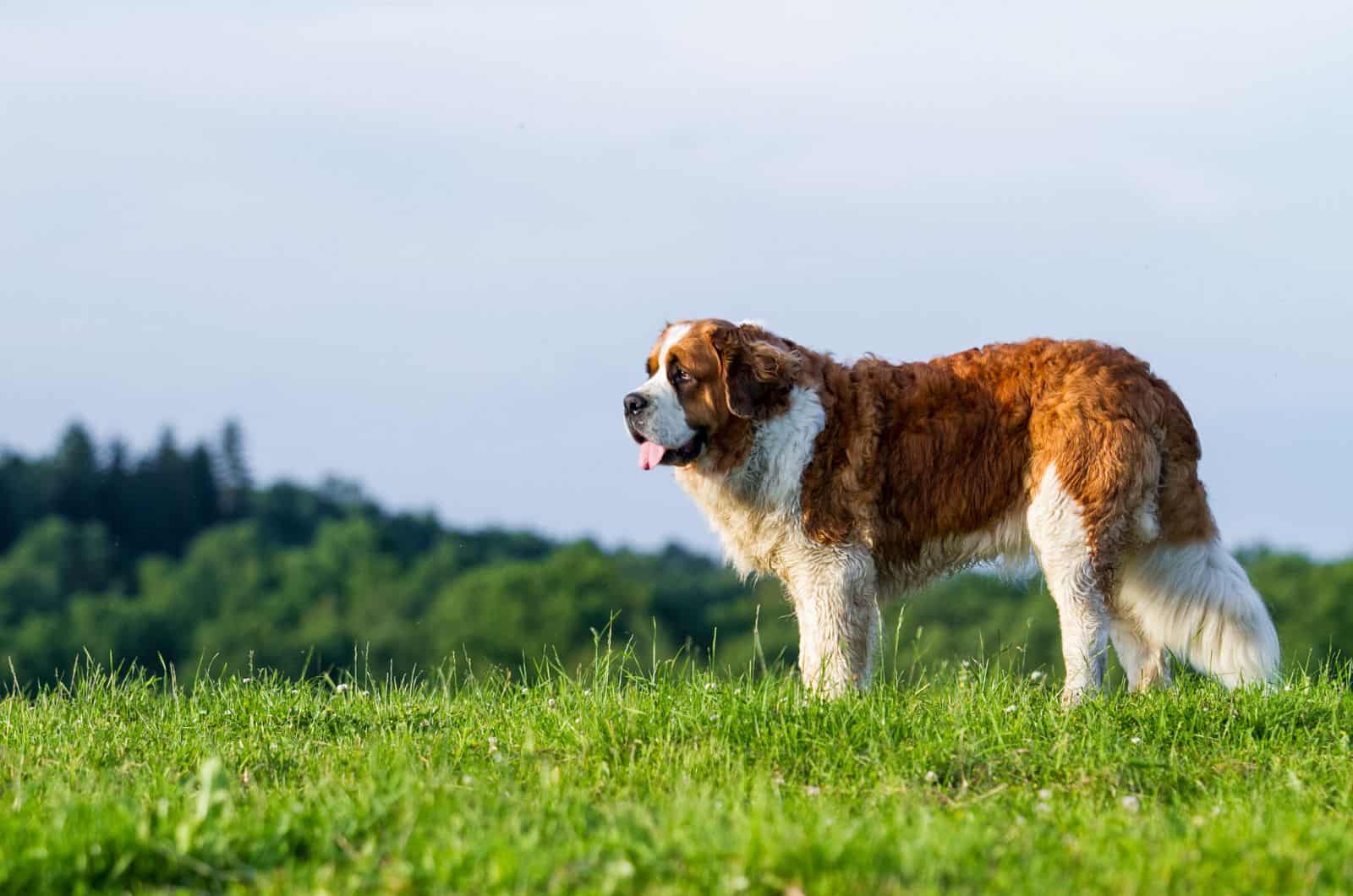
Sadly, the Saint Bernard parent is a large dog, and large dogs often have a shorter lifespan than most other dogs.
The problem with big dogs and longevity is the fact that they grow up faster and reach maturity faster than other breeds. If you follow the St. Bernard’s growth chart carefully, you’ll notice what I’m saying.
However, if you compare it to the Cocker Spaniel’s growth chart, you’ll notice the difference between these two and that they grow differently.
Our Mini St. Bernard will inherit the lifespan of a St. Bernard. You can expect these pups to live anywhere from 8 to 11 years in total. That’s really not enough, especially if you compare it to other dogs’ lifespans.
For example, Cocker Spaniels usually live for 12 to 15 years, and that’s a bit longer than Minis live.
7. They Can Be Hard To Find
I know it will be difficult for you to find Mini St. Bernard puppies. This crossbreed pooch is still new to the market. Since it is always difficult to find a good mixed-breed puppy breeder, I recommend that you check out purebred dog breeders first.
Maybe they’ll know which Mini St. Bernard breeders to trust. Maybe they’ll want to try out breeding these hybrids. You never know.
But, what you can know, is which parent breed breeders you can trust.
PupVine’s got some pretty great Saint Bernard breeders you can check out here. If you live in Canada or near the border, these Ontario St. Bernard breeders might help you.
If you’re still having trouble finding your ideal Mini St. Bernard, why don’t you check out some other St. Bernard mixes? The popular St. Bernard and Poodle mix, the Saint Berdoodle is equally as sweet as our Mini!
To Sum Up…
I bet you really like our dog of the day, the Mini St. Bernard!
How surprised are you to learn that this isn’t a shrunk version of the purebred Saint Bernard? I know I was really stunned because these dogs usually look so similar to real Saint Bernards.
But, as you know, this is a hybrid puppy, produced from a St. Bernard and a Cocker Spaniel. Two working dogs have joined together to get the ultimate cuddle pooch that knows when it’s time to play, and when it’s time to work hard.
Cocker Spaniel Saint Bernard puppies are great additions to any family. They love kids, adults, and even other pets. They’re one of the friendliest crossbreed dogs in the world.
Other than some small flaws, Mini St. Bernards are pretty close to perfection!
Read Next: The Saint Bernard Feeding Chart: How Much Should They Eat?
